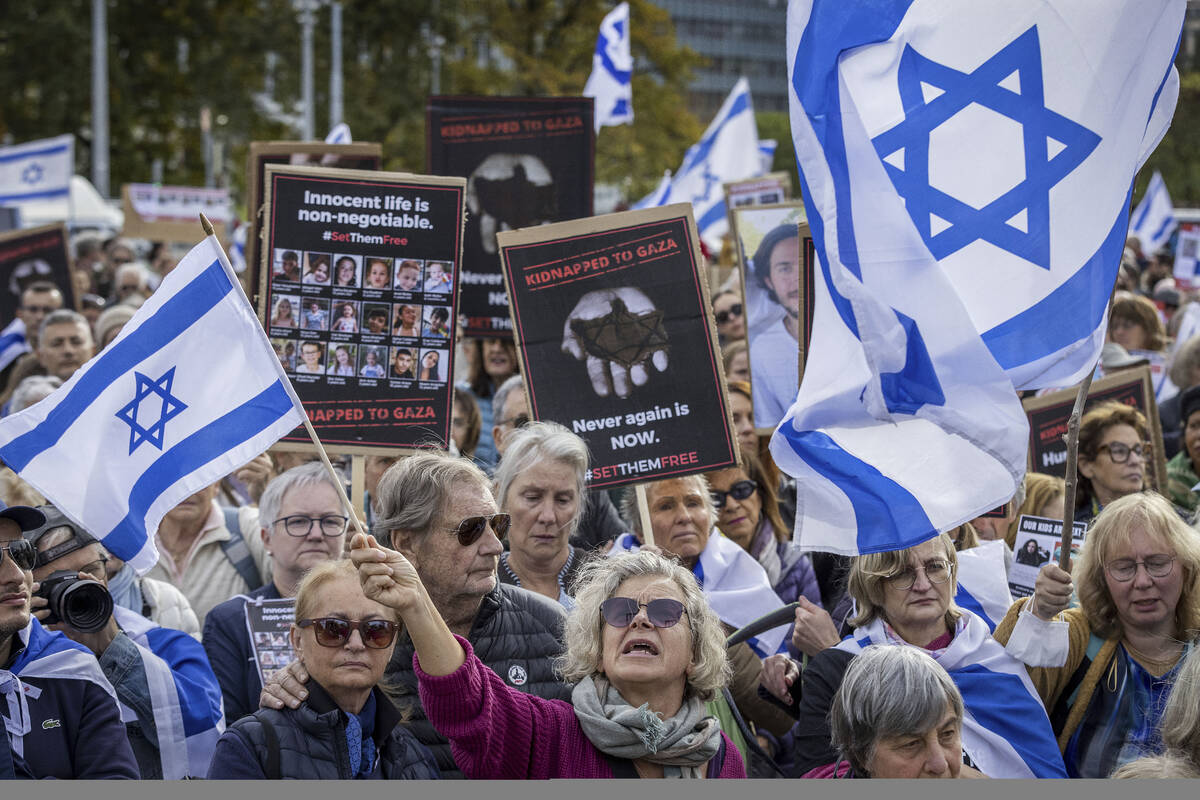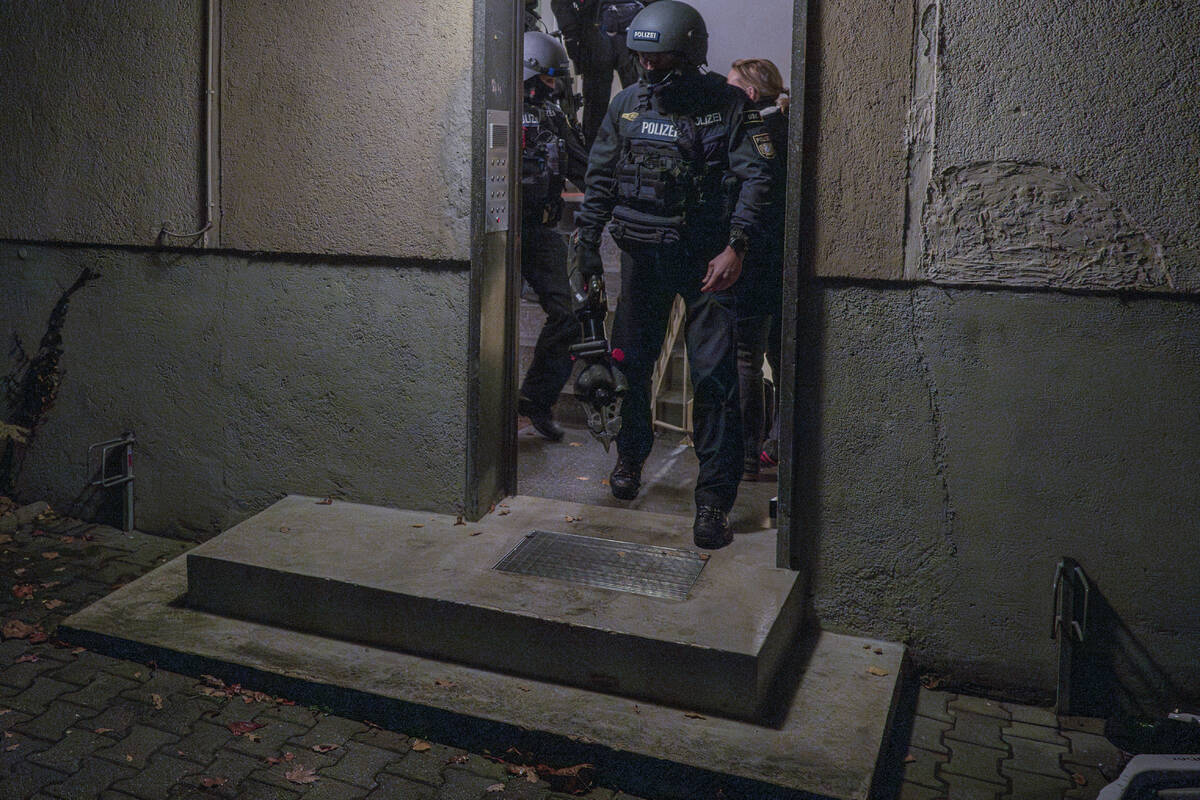With antisemitism rising as the Israel-Hamas war rages, Europe’s Jews worry
GENEVA — As he sits in Geneva, Michel Dreifuss does not feel all that far away from the Hamas attack on Israel on Oct. 7 and Israel’s subsequent bombardment of Gaza. The ripples are rolling through Europe and upending assumptions both global and intimate — including those about his personal safety as a Jew.
“Yesterday I bought a tear-gas spray canister at a military-equipment surplus store,” the 64-year-old retired tech sector worker said recently at a rally to mark a month since the Hamas killings. The choice, he says, is a “precaution,” driven by a surge of antisemitism in Europe.
Last month’s slayings of about 1,200 people in Israel by armed Palestinian terrorists represented the biggest killing of Jews since the Holocaust. The fallout from it, and from Israel’s intense military response that health officials in Hamas-controlled Gaza say has killed at least 13,300 Palestinians, has extended to Europe. In doing so, it has shaken a continent all too familiar with deadly anti-Jewish hatred for centuries.
The past century is of particular note, of course. Concern about rising antisemitism in Europe is fueled in part by what happened to Jews before and during World War II, and that makes it particularly fearsome for those who may be only one or two generations removed from people who were the victims of riots against Jews and Nazi brutality.
What most chills many Jews interviewed is what they see as the lack of empathy for the Israelis killed during the early morning massacre and for the relatives of the hostages — about 30 of whom are children — suspended in an agonizing limbo.
“What really upsets me,” said Holocaust survivor Herbert Traube said at a Paris event commemorating the 85th anniversary of Kristallnacht, the 1938 government-backed pogroms against Jews in Germany and Austria, “is to see that there isn’t a massive popular reaction against this.”
Acts of antisemitism — and how that’s defined
Antisemitism is broadly defined as hatred of Jews. But a debate has been raging for years over what actions and words should be labeled antisemitic.
Some language — whether for or against Israel or the Palestinians — “makes it sound like a football match,” says Susan Neiman of the Einstein Forum in Potsdam, Germany. “We are perpetuating the idea that you’ve got to be on one side or the other instead of being on the side of human rights and justice,” she said.
Others argue that antisemites often use criticism of Israel as a placeholder for expressing their views.
The list of examples of anti-Jewish sentiment since the Oct. 7 attacks is long and documented by governments and watchdog groups across Europe.
— Little more than a month after the attack in Israel, the French Interior Ministry said 1,247 antisemitic incidents had been reported since Oct. 7, nearly three times the total for all of 2022.
— Denmark’s main Jewish association said cases were up 24 times from the average of the last nine months.
— The Community Security Trust, which tracks antisemitic incidents in Britain, reported more than 1,000 such events — the most ever recorded for a 28-day period.
That all comes despite widespread denunciations of anti-Jewish hatred — and support for Israel — from leaders in Europe since the attack.
Some of Europe’s Jews say they see it on the streets and the news. Jewish schoolchildren face bullying on their way to class, or — in one instance — have been asked to explain Israel’s actions, according to Britain’s Community Security Trust. There’s been talk of blending in better: covering skullcaps in public and perhaps hiding mezuzahs, the traditional symbol on doorposts of Jewish homes.
In Russia, a riot broke out at an airport in which there were some antisemitic chants and posters from a crowd of men looking for passengers who had arrived from Israel. A Berlin synagogue was firebombed. An assailant stabbed a Jewish woman twice in the stomach at her home in Lyon, France, according to her lawyer.
In Prague’s Little Quarter last month, staffers at the well-known Hippopotamus bar refused to serve beer to several tourists from Israel and their Czech guides, and some patrons served up insults. Police had to step in. In Berlin, Jews are still reeling from an attempted firebombing of a synagogue last month.
“Some of us are in a state of panic,” said Anna Segal, 37, the manager of the Kahal Adass Jisroel in Berlin, a community of 450 members.
Coming to grips with a feeling of dread
Some community members are changing how they live, Segal said. Students no longer wear uniforms. Kindergarten classes don’t leave the building for field trips or the playground next door. Some members no longer call taxis, or they hesitate to order deliveries to their homes. Hebrew-speaking in public is fading. Some wonder if they should move to Israel.
“I hear more and more from people from the Jewish community who say they feel safer and more comfortable in Israel now than in Germany, despite the war and all the rockets,” Segal said. “Because they don’t have to hide there.”
And in pro-Palestinian demonstrations, some protesters are shouting, “from the river to the sea, Palestine will be free.” Some say that’s a call for Palestinian freedom and is not anti-Jewish but anti-Israel. Many Jews, though, say the chant is inherently anti-Jewish and calls for the destruction of Israel.
Faced with fears that antisemitism will spread, communities are taking action. A hotline has been set up in France to help provide psychological support for Jews. The Community Security Trust, which aims to protect the Jewish community and foster good relations with others, has joined with the British government to distribute primers on how to address antisemitism in primary and secondary schools.
Peggy Hicks, a director at the U.N. human rights office, says the actions of governments and political movements are fair game for criticism but warned against discrimination, which the Geneva-based office has long battled. In the chaos of the past weeks, she sees reason to hope.
“I’ve been amazed in the course of my working in human rights about the amount of compassion and the resilience of of human beings,” Hicks said. “People who have lost children and come together on both sides of a conflict, who have shared a loss — but from opposing sides — and who have found a way to get past the fact that they should actually be enemies.”
She added: “I don’t think everybody has the ability to show that kind of courage. But the fact that it exists, I think, gives us all something to aspire to.”
———
Kellman reported from London. Also contributing are AP writers Kirsten Grieshaber in Berlin; Silvia Stellacci in Rome; Karel Janicek in Prague; Lorne Cook in Brussels; Jari Tanner in Helsinki; Vanessa Gera in Warsaw, Poland; and John Leicester and Sylvie Corbet in Paris.























